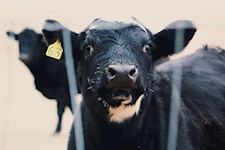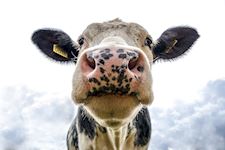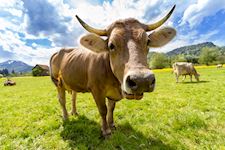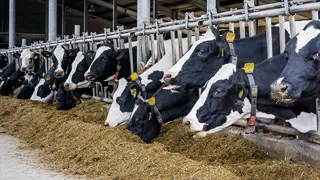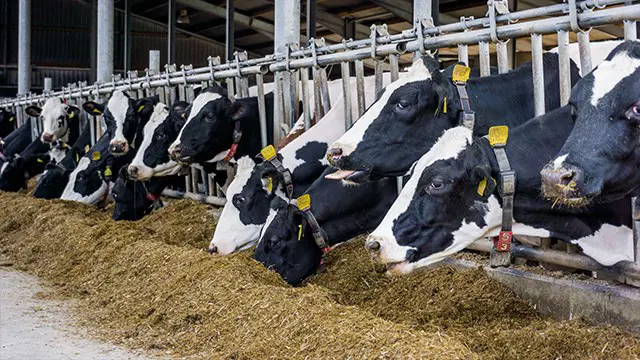
Dairy Cattle - Endorsed Certificate Course (TQUK - Training Qualifications UK)
Distance learning course with study materials, tutor support and final exam included
Academy For Distance Learning
Summary
- Exam(s) / assessment(s) is included in price
Add to basket or enquire
Overview
Dairy Cattle Online Course.100 Hours Endorsed Certificate Course (TQUK - Training Qualifications UK).
Learn to independently analyse and make decisions about the management requirements of dairy cattle: comparing dairy breeds, managing anything from one cow to a large herd, and producing dairy products (milk, cheese, cream butter etc).
This is a very sound foundation course developed in collaboration with industry and by our team of experts (agricultural and animal scientists, veterinary surgeons etc).
This is a very practical foundation course; providing unique and extensive support from university qualified and industry experienced experts. If you want to learn about dairy cattle and their management, this is the course for you.
Benefits of an ADL Endorsed Course?
Endorsed courses are skills based. They have been evaluated and approved by an independent awarding body such as Training Qualifications UK (TQUK).
What makes ADL’s Endorsed courses different?
- Flexible Self-Paced Learning– adjust your learning around your home and work commitments
- Start and Finish at any time
- Courses globally and industry relevant
- Practical Component at the end of most lessons.
Allocated your own tutor relevant to your subject. You can have as little or as much contact as you like with your tutor. They are there to support you all the way through.
This course is endorsed by TQUK -Training Qualifications UK, an OFQUAL awarding body.
Achievement
Course media
Description
Lesson Structure:
1 Dairy Breeds
- Dairy Breeds: Choosing a Dairy Breed
- Comparison of Dairy Breeds: The Ayrshire, The Guernsey, The Jersey, Holstein – Friesian, Brown Swiss, Milking or Dairy Shorthorn
- Score Card: General Appearance, Dairy Character, Udder
2 Dairy Products
- Milk: The Composition of Milk, The percentage breakdown of the composition of milk, Protein, Lactose, Ash
- Factors Affecting the Composition of Milk: Feed, Weather, Stages of Milking, Incomplete Milking, Frequency of Milking, Disturbance, Dipping, Individuality of the Cow, Breed, Course of Lactation, Gestation, Age of the Cow, Oestrus and Gestation, Disease
- Milk: Oxidation, Lipolysis
3 The Lactation Cycle
- The Lactation Cycle
- The Influence of the Farmer on Lactation
- Is Every Cow in My Herd Producing to its Genetic Potential?: Infertile Cows, Feeding, The Milking Shed
- Planning for Feed-Flow: Climate, Soil Type, Irrigation, Aspect, Slope, Natural pastures, Management, Present Feed Flow
- Planning the New Feed-Flow Program
4 Pests & Diseases of Dairy Cattle
- Mastitis: Types of Mastitis, Mastitis-Causing Organisms, Contagious Bacteria, Environmental Mastitis Organisms
- Mastitis Detection - Cell Counts: Mastitis Control, Effective Shed or Parlour Routine, Milking Equipment, Treating Mastitis
- Correct Treatment Techniques
- Dry Cow Therapy: Difficulties of treating lactating cows, Drying off - the danger period
- The Five-Point Plan Against Mastitis
- Viral & Bacterial Diseases in Cattle: Signs of Health in Cattle, Other signs which should be noted
- Disease Types in Cattle
- Viral Diseases
- Bacterial Diseases
- Parasitic Diseases
- Protozoal Diseases
- Other Diseases: Screw Worm, Ophthalmia
5 Feeding Dairy Cattle
- Feeding the Dairy Cow: Working out Dairy Rations, Maintenance Requirements for a Dairy Cow, Production Requirements, Working out the Total Needs of a Dairy Cow, Feeding a Ration to Meet the Nutrient Needs, Roughage, Concentrate Foods
- The Dairy Ration
- Working Out the Cost of Dairy Rations
- Model Answers to Dairy Feed Exercise
6 Managing Dairy Cattle
- The Dairy Heifer
- Managing the Heifer: Growth, Measuring Growth, Why emphasise growth?
- Feeding the Heifer: Factors Affecting Growth
- Age of Breeding: Effect of Early Breeding on Size of Animals, The Effect of Early Calving on Milk Production
- The Dairy Cow: Management of the Dairy Cow, Factors Affecting the General Health of a Cow
- Factors Affecting Milk Yield: Lactation Curve, Breed, Milking Frequency, Age, Milkings, Season, Heat Stress, Feeding
7 Breeding Dairy Cattle
- Selection: Animal Breeding Programs, Have a Clear Aim, Decide on your priorities, Dual Purpose Animals
- Artificial Selection: Understanding The Sire, Selection Intensity, The Generation Interval, The Heritability, Selection for Milk Yield, Gene Groups
- Regression
- Selection Using Family Groups
- Disadvantages of Inbreeding
- Performance Testing: Sib Testing, Progeny Testing, Contemporary Comparisons and Relative Breeding Values (R.B.V.), Relative Breeding Value (R.B.V.)
- Artificial Insemination: The Technique of Artificial Insemination, Synchronised Heats
- Ova Transplants
8 Managing Dairy Facilities
- The Dairy
- Basic Requirements of All Dairies: Siting of Dairy Premises, The Milking Shed, The Dairy Room and Wash-up Room, Milkers' Wash Room and Lavatory, Water Supply, Drainage, Equipment
- Cooling of Milk
- Machine Milking: Planning a Milking Machine System, Reasons for Using Milking Machines
- Components of a Milking Machine: The Vacuum Pump, Teat Cups and Liners (Inside the Clusters), Claw-piece or Beaker-cup, Cluster, Pulsator, Vacuum Controller, Sanitary Trap, Releaser, Pipelines
- Choosing a System
- Different Types of System: Normal Cowshed, Abreast Milking Shed, Turntable Milking, Open Sided Shed
- Other Considerations: Handling facilities, Computers
- Four Essential Points When Choosing a Milking System: Vacuum Stability, Udder Stimulation, Milk Quality, Emergency Facilities
9 Dairy Business Planning
- Economics of Dairying
- Business Plan Example
- Break-Even Production
- When Fodder is Bought In
- What is a Heifer Calf Worth at Birth?
- How Long a Cow (That is Not In Calf) Should Be Kept
- Months to Wait
Each lesson culminates in an assignment which is submitted to the academy, marked by the academy's tutors and returned to you with feedback, any relevant suggestions, comments, and if necessary, extra reading.
Who is this course for?
Agriculturalists, Farmers, Animal Breeders
Requirements
A pc or laptop with internet connection.
Career path
ADL has helped thousands of people develop their farming and agricultural knowledge and skills. This course is perfect if you're aspiring to become a farmer or if you'd like to further develop your career in farming.
Questions and answers
Whilst in NZ I took a job as a tanker driver collecting milk off farm. Dairy farming became a dream. Will this course be a good foundation to learn?
Answer:Hi Dean. Absolutely. This course is a fantastic entry level course into the industry. This is a very practical foundation course, where you will learn all about dairy cattle and their management. You will be assigned your own tutor, who will help you through the entire process. After passing the course and receiving your TQUK endorsed certificate, you can either try and seek employment or continue with further studies. Kindest regards Amanda White General Manager
This was helpful.
Reviews
Currently there are no reviews for this course. Be the first to leave a review.
Legal information
This course is advertised on reed.co.uk by the Course Provider, whose terms and conditions apply. Purchases are made directly from the Course Provider, and as such, content and materials are supplied by the Course Provider directly. Reed is acting as agent and not reseller in relation to this course. Reed's only responsibility is to facilitate your payment for the course. It is your responsibility to review and agree to the Course Provider's terms and conditions and satisfy yourself as to the suitability of the course you intend to purchase. Reed will not have any responsibility for the content of the course and/or associated materials.

